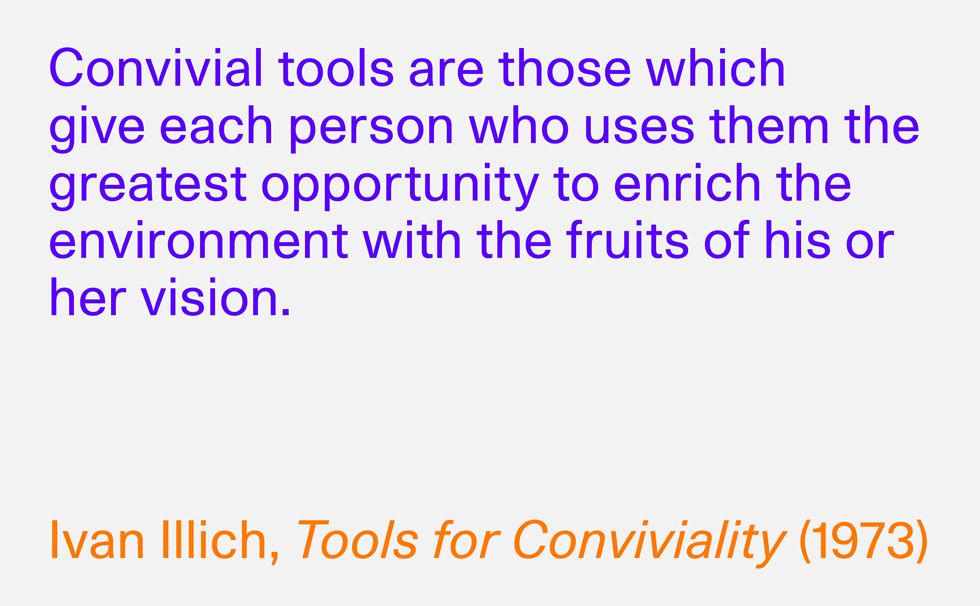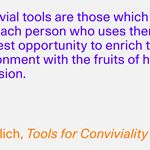Symposium Book now
Convivial Tools
Join a symposium exploring new approaches for a more cooperative society, based on the thinking of the late philosopher Ivan Illich.
What to expect
In his book ‘Tools for Conviviality’ (1973), the late Austrian philosopher Ivan Illich argued that the nature of modern ‘tools’, from machines to schools, had the effect of making people dependent and undermined their own natural abilities. What he called “convivial tools” were those that encouraged people to think for themselves and be more socially engaged.
Convivial Tools is a programme of talks, debates and workshops exploring new strategies for a more cooperative society. Using Ivan Illich’s concept of “conviviality”, it will bring together designers, artists, media theorists, curators, and social thinkers from diverse fields to examine current tools and technologies that encourage alternative modes of production and social relations.
Working together with those in the cooperatives movement – which includes economists, technologists, philosophers, sociologists and proactive citizens – the programme will explore whether they can help to create what Illich would call a convivial society.




Speakers
Speakers include; John Thackara, Eleanor Saitta, Joseph Rykwert, Ben Vickers, Torange Khonsari, Adam Greenfield, Ben Terrett, Sarah T Gold, Dougald Hine, and many more…
Schedule
Welcome
11.00-11.15
Sumitra Upham and Justin McGuirk
What are Convivial Tools?
11.15-12.15
Chair: Justin McGuirk
Adam Greenfield, Nina Power and John Thackara
Illich argued that we will never be an effective society until we take back control over tools and institutions that negate our own natural abilities. Illich believed that tools are intrinsic to social relationships. They should not enforce power and compulsion, but rather encourage participation, trust and sociability:
“Convivial tools are those which give each person who uses them the greatest opportunity to enrich the environment with the fruits of his or her vision. Industrial tools deny this possibility to those who use them, and they allow their designers to determine the meaning and expectations of others.”
This first session will discuss the criteria for a convivial society in today’s networked age, and the tools needed to shape it.
Reflection 1: Dougald Hine
12.15-12.35
Schooling or Deschooling?
12.35-13.35
Chair: Joseph Grima
Torange Khonsari, Nils Norman and Vera Sacchetti
The book that brought Illich to public attention was Deschooling Society (1971), a radical critique of the nature of institutionalised education in western society.
This session explores the legacy of Illich’s thinking around education. Drawing on current models of alternative education, speakers will explore the implications of de-schooling, the meaning of convivial education, and the internet as a convivial tool.
Lunch
13.35-14.30
Emergent Cooperativisims
14:30-15:30
Chair: Ben Vickers
Sarah T Gold, Eleanor Saitta and Ben Terrett
How are new technologies helping to create a more cooperative and convivial society? What limits do we need to place on digital tools in order to prevent them from overshadowing and undermining human ability?
In this session, Illich’s concept of conviviality will be used as a framework for a discussion on the potential of an open, networked society and how the co-operatively owned Internet is becoming a reality. The group will reflect on emerging tools and technologies enabling greater social production, new forms of citizen participation and digital commons.
Reflection 2: Joseph Rykwert
15.30-16.00
The Open Session
16.00-17.00
This final session is an opportunity for any of the participants, and anyone in the audience, to reflect on the day’s proceedings and what the learnings might be.
Respondents: Adam Greenfield, Natalie Kane, Ruth Catlow, Stacco Troncoso and many more…
Related event